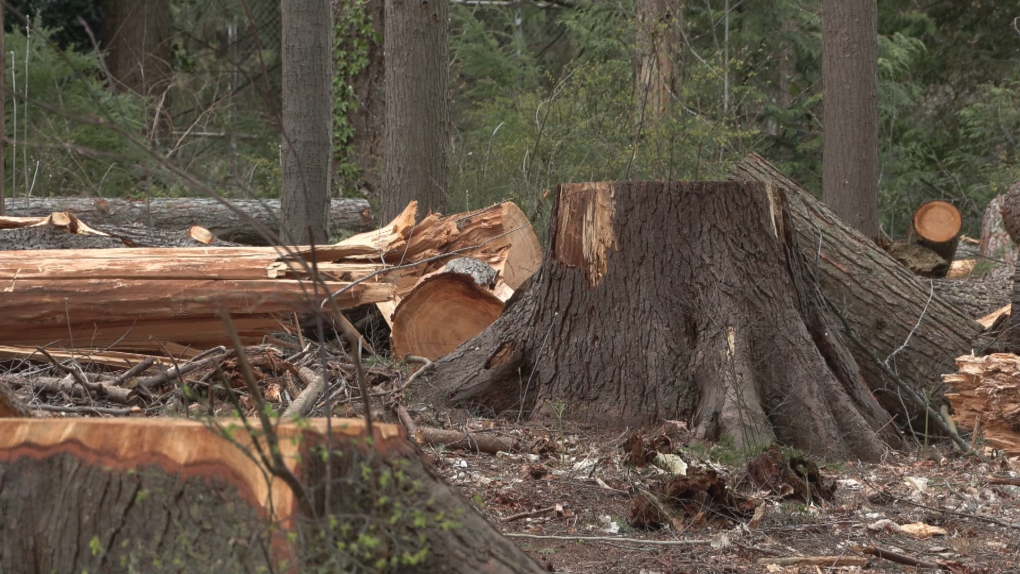Vancouver Park Board to vote on second phase of Stanley Park tree removal
 Downed trees, felled due to a looper moth infestation, are seen in Stanley Park in March 2024. (CTV News)
Downed trees, felled due to a looper moth infestation, are seen in Stanley Park in March 2024. (CTV News)
The second phase of a planned massive tree removal in Stanley Park is on the agenda at the park board Monday night.
About 160,000 trees have been classified as dead or dying as a result of a hemlock looper moth outbreak and will be cut down. The number works out to about one-third of all trees in the beloved green space.
Crews cut down about 7,000 trees earlier this year, drawing criticism from some residents.
Twent five per cent of Stanely Park’s area was targeted in the first phase of the project and 11 per cent will be targeted in the next phase – with plans to begin in mid-October.
Michael Caditz is the founder of Save Stanley Park. He believes the science does not support the plans to remove the trees.
“The hemlock looper is endemic, it’s native, it’s part of the ecosystem,” he said. “That’s what’s concerning to people. This is only the beginning.”
According to Richard Hamelin, a Forrest and Conservation Science professor with the University of British Columbia, hemlock looper usually disappears after a few years.
“It’s a good question, ‘Why not let nature do its thing?’” said Hamelin. “Normally that is what you would do if there was not so many visitors to the park.”
The decaying trees create safety hazards, even the hemlock trees that may appear fine on the outside, can often be rotting inside, he says.
Brennan Bastyovanszky, the park board chair, says the trees are being removed as a safety precaution – saying the concern is that they could fall down on a car, building or person.
"Those risks are real at the moment,” he said
"If we were up in Whistler, if we were in the Interior and people weren't around and there wasn't a highway driving right through it, I would have had a different approach,” he said.
Since the removal started, there have been 25,000 new seedlings planted, according to the park board.
CTVNews.ca Top Stories

Heavy snow, freezing rain warnings hit parts of Canada, expected to last throughout Monday
Significant snowfall and heavy rain hit parts of Canada on Sunday and the weather system is expected to continue into Monday morning and throughout the day.
BoC expected to lower interest rates again, with odds leaning toward larger cut
Financial markets and forecasters are betting on another jumbo interest rate cut from the Bank of Canada this week.
The Canada Post strike involving more than 55,000 has hit 25 days
The Canada Post strike involving more than 55,000 workers has hit 25 days.
Celebrities spotted at Taylor Swift's final Eras Tour performance in Vancouver
Taylor Swift fans from around the world gathered in Vancouver on Sunday to witness the final performance of her massively popular Eras Tour, including a few celebrities.
Government faces third Tory non-confidence vote ahead of potential fiscal hurdle
The Liberals are set to face a third Conservative non-confidence vote today, but the government is likely to survive with the support of the NDP.
Most Canadians view illegal immigrant border crossings as concern for U.S.: Nanos survey
More than 80 per cent of Canadians believe the flow of illegal immigrants from Canada to the U.S. is a concern, according to a new survey.
Jay-Z denies allegations he sexually assaulted a 13-year-old in 2000 with Sean 'Diddy' Combs
A woman who alleges she was sexually assaulted by Sean 'Diddy' Combs has amended her lawsuit to include allegations that she was also assaulted by Jay-Z at the same party.
Taylor Swift ends record-smashing Eras Tour in Vancouver, after glittering global run
Taylor Swift took the stage for the final time on her record-smashing Eras Tour, watched by tens of thousands of delirious fans in Vancouver's BC Place arena and by millions on livestreams around the world.
Syrian prime minister says government is still functioning but foreign and domestic challenges loom
Syria's prime minister said Monday that most cabinet ministers are still working from offices in Damascus after rebels entered the capital over the weekend and overthrew President Bashar Assad. Streams of refugees crossed in from neighboring countries, hoping for a more peaceful future.






























